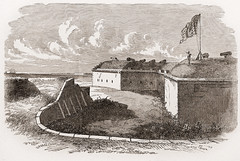This is the first of a series of posts, generally daily, on the events and milestones related to the Civil War from 160 years before the date posted. This post is a “catch up” post to bring the blog up to date, starting with the election of Lincoln.
- 11/06/1860—United States presidential election: Abraham Lincoln elected President and Hannibal Hamlin vice president with only 39.7% of the vote in a four man race, defeating Stephen Douglas, John Breckinridge and John Bell.
- 11/09/1860—South Carolina calls for a convention on December 17 to decide if the state should secede from the Union
- 11/09/1860—Lame-duck president James Buchanan convenes a cabinet meeting to discuss the national crisis that has been unleashed in the wake of Lincoln’s election. Like the country as a whole, his advisors are split over the issue of secession. Buchanan proposes a convention of the states with the object of hammering out a compromise.
- 11/10/1860—South Carolina Senator James Chesnut becomes the first Southerner to resign from the Senate. He is quickly followed by South Carolina Senator James H. Hammond.
- 11/10/1860—The legislature of South Carolina orders a convention to meet in Columbia on December 17 to decide whether or not the state should remain in the Union.
- 11/12/1860—In Preston County, Western Virginia holds its first organizational meeting, expressing a desire to “adhere to the Union”.
- 11/13/1860—At the end of a fiery, pro-secession speech, Robert Toombs announces his resignation from the U. S. Senate at the end of his term.
- 11/13/1860—The South Carolina legislature authorizes the raising of ten thousand men for the state’s defense.
- 11/14/1860—In Milledgeville, Alexander Stephens gives a response to Toombs’ speech the day before, calling for a meeting of southern states to discuss secession; speaks out against secession. He argues that the South should pursue a more moderate course and, “Let the fanatics of the North break the Constitution, if such is their fell purpose.”
- 11/18/1860—The Georgia legislature authorizes one million dollars for weapon purchases.
- 11/23/1860—Major Robert Anderson reports Fort Sumter is being threatened in Charleston as federal forces begin to improve Fort Moultrie and Fort Sumter in the harbor. The report identifies Fort Sumter as the key to the defense of the city’s harbor. In addition, he argues that secession is a fait accompli in South Carolina.
America’s Civil War, Events by Date. Retrieved December 13, 2020, from http://blueandgraytrail.com/; Presented by Georgia’s Historic High Country Travel Association
